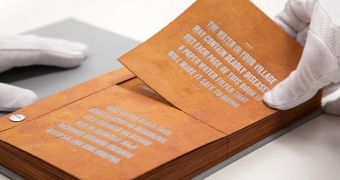Drinkable water isn't as ubiquitous in nature as you might think. Because of that, filtration systems were put together. A team from McGill University and University of Virginia chemist Dr. Theresa Dankovich have invented a really uncanny means of filtering water.
Specifically, they have invented the Drinkable Book, which will provide you with four years' worth of drinkable water.
The moniker isn't exactly accurate though. You see, it's not the book you're supposed to drink. After all, it's still made of paper. In fact, it even has words written on it.
There is no actual story there, however, only a warning that your settlement may not have truly safe water.
And since impure water tends to transmit a lot of diseases, filtering it is pretty important. That's what the paper (filter paper to be exact) is for. Each page has a pair of filters and will provide clean water for thirty days.
It's not just villages from third-world countries and out-of-the-way regions that should consider buying one of these things though.
Hikers might want to consider carrying one or two with them as well. You see, natural streams, ponds and rivers aren't necessarily safe.
We've all seen films where the main characters come upon a crystal-clear spring and proceed to quench their thirst after days of lost wanderings, but doing something like that in real life is dangerous.
There is a reason that no living beings can be found in them. More often than not, such springs are tainted by arsenic, or some pathogen.
If you're in the mountains, it's safer than anywhere else, or at least easier to make sure the water isn't harmful. Just check to see if fairy shrimps live there and you're all set. If tadpoles live wherever the spring water pools, it's another hint that it's okay to drink spring water.
Of course, if you're a hiker, you probably have water purifying pills with you, so use those in a water bottle before you drink anything. Bacteria and microbes will be killed that way.
That's not exactly a cost-effective or long-lasting method for settlements though, hence the invention of the Drinkable Book.
Amusingly enough, the paper that makes up the Drinkable Book is somewhat similar to ink sponge paper, which could be used to filter drinkable water in a pinch, but not for long. It will tear and dissolve rather easily, making its effectiveness at killing waterborne diseases significantly less.

 14 DAY TRIAL //
14 DAY TRIAL //